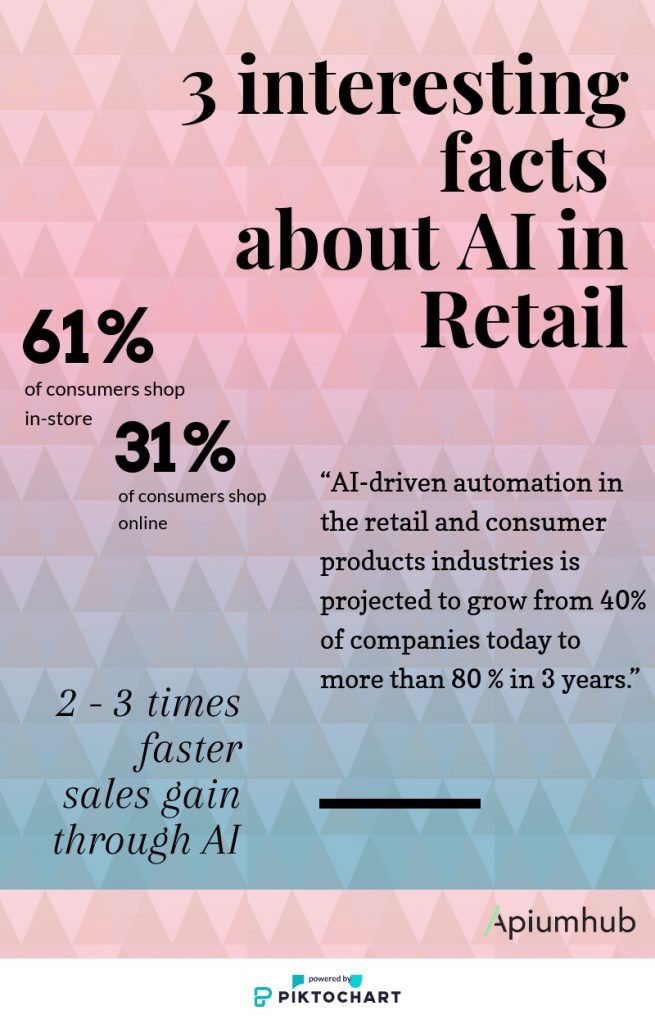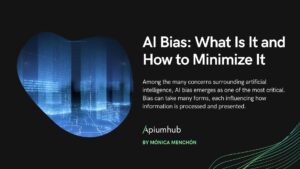The real-world shopping experience is still relevant, even in times where traditional brick and mortar shops are facing increasing competition from online shops. However, according to punchbowl.com brick and mortar still matter as 61% of consumers shop in-store, compared to only 31% who turn to the internet. So Brick-and-mortar sales aren’t fading anytime soon. Retailers are updating in-store technology to increase the customers shopping experience. Artificial Intelligence (AI) has become a key element in the digitalization of in-store retail by personalizing the customer experience and creating a more engaged business-to-consumer interaction. According to IBMs latest study about “The coming AI revolution in retail and consumer products”, that surveyed 1,900 retail and consumer product representatives across 23 countries the adoption of AI-driven intelligent automation in the retail and consumer products industries is projected to leap from 40 percent of companies today to more than 80 percent in three years. Retailers and brands are initially using intelligent automation to improve efficiency and reduce costs. As the capability matures, it opens up entirely new ways of doing business that can increase operational agility, improve the quality and speed of decision making, and enhance the customer experience. In the following parts, three examples are presented of big players in the retail industry that successfully implemented AI in the their business operation. So is AI in retail industry becoming the future?
Mango and Vodafone launch the Digital Dressing Room
Two big companies have joined together in the sign of digital and technology, making the shopping experience more interactive; Mango in partnership with Vodafone.
“Mango is excited about this project. For us the future of retail lies in the combination of online and offline – says Guillermo Corominas, Chief Client Officer of Mango. These new dressing rooms represent a further step in the digital transformation of our stores, which will offer our customers a completely new experience ” (Corrierecomunicazioni, 2019).
Vodafone and Mango launch the digital dressing room, as AI in retail industry. This technology consists in a digital mirror of Internet of Things designed by Mango and developed by Vodafone in collaboration with Jogotech, which will allow the clients to scan the clothing inside the dressing room, and to contact the store staff directly from the mirror, to request other colors or sizes. The mirror will also suggest other clothing to match chosen by the client.
Mango’s mission is to extend the digital dressing room to all its principal stores, from Barcelona to New York, with the objective of benefiting customers with a shopping experience that combines the digital and physical component and mix AI in retail industry. For the famous clothing brand, this initiative is the first step for a digital transformation project that aims to create new forms of involvement between customers and the brand.
“This project helps us give more power to the customer and will help Mango get closer to fashion-conscious customers, because it offers more options and experiences than a conventional dressing room,” comments Stefano Gastaut, director of the Vodafone Internet of Things (Corrierecomunicazioni, 2019).
Digital mirrors could be a crucial element in smart manufacturing and supply chains, matching stock to demand while reducing waste The presence of cameras in changing rooms may be a negative factor for some shoppers, and this will need careful management and control. For this reason, some retailers insert them in the store, rather than in private areas. But digital fitting rooms may help retailers to solve some problems. They may be a way to gather customer data via AI in retail industry or many shoppers go into a normal fitting room once try on items, and then either buy or leave, losing any opportunity for the retailer to engage with them during those critical moments (Vodafone, 2019).
You need advice on your wardrobe? Ask Alexa!
Amazon has incorporated a camera into the software of Alexa: Echo Look takes photos and videos from voice commands. These photos can be published through an app in which you can ask for advice on trends, compare two outfits, cross data with the weather forecast to know what to wear and even ask him to “pack you” with the best combinations of your wardrobe.
With this example, we can see how AI in retail industry is changing the retail world. You don’t have to go to the shop anymore to ask for professional assistance about the trends or about what fit or combination is best for you (Planetachatbot, 2017)
AI Solves Zara’s Return Issues
In the online fashion store, returns are twice those of the offline store and the causes are usually a high percentage by size and fit. Given the cost of each return, added to the stock stoppage it causes, fashion brands are focusing on solving this problem which also impoverishes the shopping experience. Zara for example has made the size chart evolve and now suggests the right size based not only on the measurements the user gives but also on their preferences (looser, tighter clothing) and the return of that garment by other users with the same measurements and tastes. They hope to reduce the number of returns per garment, not only in repeat purchases but even for first purchases. To sum up, thanks to AI in retail industry they can reduce the stock and reduce the returns. It means higher profitability and this is the most important for the retailer (Planetachatbot, 2017).
The Seamless Sephora Experience
Sephora is implementing the use of AI in retail industry to create an omnichannel retail approach. By investing in AI, Sephora has created a seamless experience for the customer across both digital and retail outlets. The introduction of AI started 2015 when Sephora launched its innovation lab to focus on how to use different types of artificial intelligence such as natural language processing, machine learning and computer vision to bridge the gap between its online and in-store experiences. According to a report by BCG, retailers that have implemented personalization strategies see sales gains of 6-10% at a rate two to three times faster than other retailers.
In store, Sephora has been able to create a better customer experience by finding ways for the consumer to interact with AI. In the short term, Sephora is investing in AI and partnering with personalization specialists such as Dynamic Yield to provide personalized product recommendations to customers. “Dynamic Yield’s machine learning algorithms weigh factors like location, items previously viewed, and items purchased. This led to a return of six times on Sephora SEA’s financial commitment to the partnership.” Also Sephora is employing a wide range of AI technology across their app and in-store to help drive retail sales. Some tools they have used are: Sephora Visual Artist – 3D live experience that enables customers to try on product virtually via Sephora’s app and in store, Tap & Try – ability to tap on a product in store and try the product on virtually, Color IQ – Device that scans the surface of your skin and assigns it a Color iQ number which reveals scientifically precise foundation matches (Rctom.hbs, 2019)
The Revolution of Retail Stores
We might conclude, after the examples mentioned above, that conversational AI in retail industry will have a major impact on the customer experience in retails stores. It not only provides the link between the online and offline connection with the customers, it helps in personalizing the total shopping experience. Conversational AI can for instance offer advice in products, adapted to the wishes of the customer. Moreover it is more time efficient for customers cost efficient for companies as it decreases the time they have to search for products. Moreover, conversational AI also contributes in the data collection about the shoppers and through this for example special offers can be created more easily. With this, customer engagement can also increase, and new customers can be attracted to stores. Conversational AI will be the next step in the digital transformation of the retail branche….
Authors: Evelyn Rijpma, Geraldo Garcia Lopez, Toni Bautista, Valeria Muscatello, Linda Dinse
If you are interested in more topics around AI, please see also:
- Artifical intelligence in eCommerce
- 5 AI impacts on tech industry in 2019
- 5 AI trends that will change the future of sales in 2019
Sources:
- https://www.ibm.com/downloads/cas/NDE0G4LA
- https://www.vodafone.com/business/news-and-insights/press-release/vodafone-and-mango-make-digital-fitting-rooms-a-reality
- https://www.drapersonline.com/news/mango-to-launch-digital-fitting-rooms/7029101.article
- https://rctom.hbs.org/submission/sephora-and-artificial-intelligence-what-does-the-future-of-beauty-look-like/










